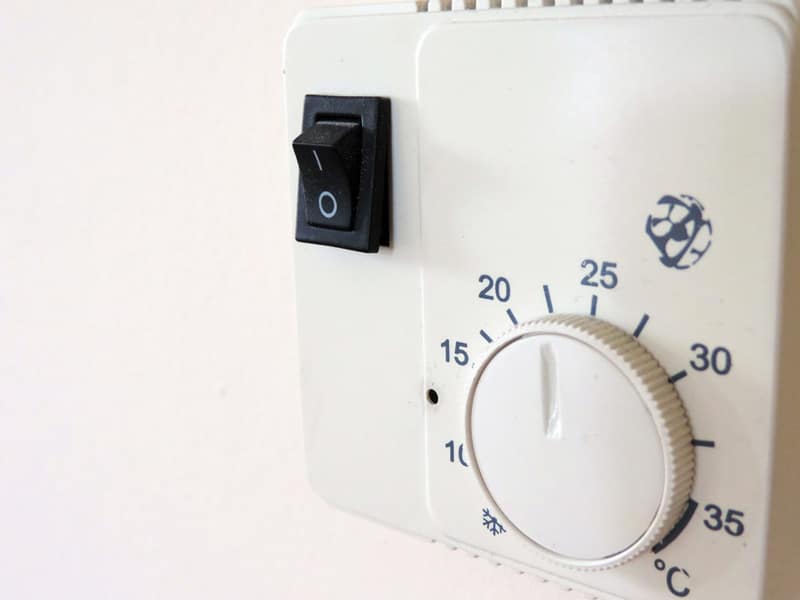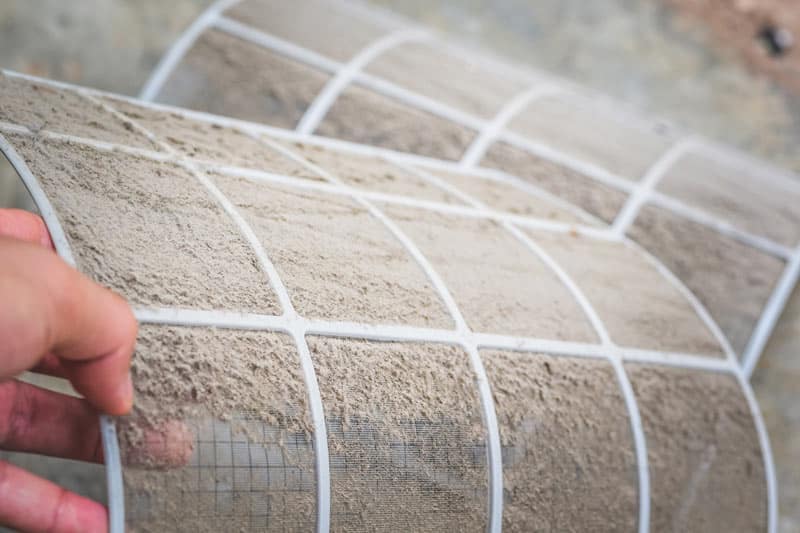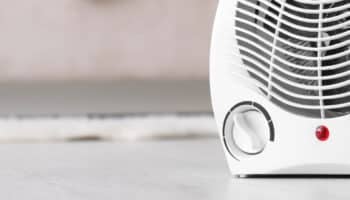Is your space heater refusing to turn off? The fan motor could be to blame. This might be why.
Space heaters are simply amazing. They’re easy to use, relatively inexpensive, and provide us with a steady heat source that makes cold seasons much easier to bear. There’s a lot to love, and not too much to complain about.
That is… until they start malfunctioning.
If you’re reading this, your space heater is refusing to turn off and is making your living room hotter than a Texas summer. I was in your position not too long ago, so trust me when I say that I understand how frustrated you are.
But not all is lost.
In order to fix my issue, I had to do thorough research and gather useful information. Today, I want to share my findings to help you get your space heater back to normal.
Below, you will find a list with the most common causes behind this occurrence, and the simplest steps you can take to address each one of them. I’m confident that, if you stick to them religiously, this event will be nothing but a bad memory, soon to be forgotten.
Sounds good? Let’s get busy!
Fixing a Malfunctioning Space Heater
Now, before you start turning screws and removing panels, remember that the troubleshooting process benefits greatly from detail and order.
I know how tempting it must be to get answers straight away, and look for them in your internal components. But this will most likely only waste your precious time, and money, as well as damage the unit further.
Bear with me and be patient. I promise we will get to the bottom of this together.
Here are 5 reasons why your space heater might be refusing to turn off:
- A faulty thermostat
- A dirty air filter
- A broken fan motor
- A bad heating element
- A fried circuit board
#1 A Faulty Thermostat

The first thing I want us to take a look at, is your thermostat.
In case you’re not familiar with what this component does, let me briefly explain. Your thermostat is responsible for both sensing and regulating your space heater’s internal temperature.
It is through this part that your unit prevents overheating, and stays at your desired settings.
When it works normally, it should give you no problems. However, any malfunction could trick it into thinking the heater is not yet hot, even when it is. This would explain why your appliance refuses to turn off, even when it has reached the preset temperature.
It is of utmost importance that, as soon as you suspect this to be the source of the problem, you stop using your machine until you test and replace the part.
Solution: The process may vary from model to model, but the broad strokes should be the same for all of them.
- Carefully unplug the appliance, and let it cool down completely
- Turn it around, and undo the screws holding the back wall panel in place
- Remove the back wall panel, and expose the unit’s guts
- Locate the thermostat
- Test it for continuity with a multimeter (if you have one)
If you get null readings on the meter, it means that the part is dead, and you need to buy a new one.
You should be able to get a replacement either from your nearest hardware store or your manufacturer.
#2 A Dirty Air Filter

You might be wondering why a heating appliance would need an air filter, and the answer is simple.
To protect its internal components from harmful particles.
While your space heater does not pull in air in the same way as a dehumidifier or an air conditioner do, it’s still always in contact with the outside world. The filter works as a shield between your unit, and everything else in the air.
When it’s clean and unobstructed, it allows for free air flow. However, if left unattended for long, debris and dirt can collect on it.
This may sound like something unimportant, but trust me, it’s not. Dirty or obstructed filters can quickly lead to overheating, which can decrease your appliance’s lifespan and cause a myriad of issues.
Solution: While most manufacturers claim that their filters are lifetime guaranteed, this is not always so. Ideally, you want to clean your filter once every month and replace it once or twice a year, depending on how often you use the appliance.
If you’ve cleaned your filter before, feel free to move on to the next point. However, if this is your first time, please read the following steps carefully:
- Carefully unplug the appliance, and let it cool down completely
- Remove the frontal panel (it should come off easily)
- Remove the filter and wash it with dish soap under running water
- Let it dry completely, and vacuum off any remaining debris
- Reassemble
Make sure to look out for any kind of damage or tearing on the filter, as it could compromise the part’s adequate functioning.
#3 A Broken Fan Motor

This may not apply to every model, but if yours has a fan, this definitely concerns you.
The fan motor inside your space heater does more than it gets credit for, as it not only distributes heat evenly throughout the room, but also keeps the appliance from overheating.
Moreover, some models have a sensor in the fan motor which tells the machine when to shut off after ideal temperature has been reached. When it malfunctions, the sensor cannot tell when the temperature is right, and thus, fails to prompt the heater to shut off.
If your space heater is refusing to turn off, there’s a very good chance that you need to replace this component.
Solution: Please follow the steps from point #1 to gain comfortable access to your fan motor, and the limiting sensor described above.
There are many ways in which you can test whether the part is working, but one of the most efficient ones is by using a multimeter to test it for continuity.
#4 A Bad Heating Element

This is the lifeblood of your space heater.
Your heating element is responsible for transforming the electrical energy drawn from your wall outlet, into heat. This component is very useful; however, when it malfunctions, things can go one of two ways.
You can either be stuck with a component that does not generate heat, or one that generates too much. The latter condition is much more concerning, as it could cause permanent damage to your appliance.
If your space heater is refusing to turn off, this, along with a bad thermostat, could be preventing it from sensing its internal temperature, and deactivating when it should.
It is of the utmost importance that you stop using your space heater until you replace this part with a functioning one.
Solution: Please follow the steps from point #1 to gain comfortable access to your heating element, and test it for continuity.
I’d be remiss not to mention that an overheating heating element can still give off positive readings on the meter, so look closely.
#5 A Fried Circuit Board
Last, but definitely not least, let’s consider the possibility of a fried circuit board.
This component is your space heater’s heart and soul. It allows for communication between all other internal components, and overall functioning of the unit.
A board can fry due to extreme overheating or large power spikes caused by blackouts. And while there are several components and countermeasures built into your heater to prevent this from happening, it will, sadly, always be an unwanted possibility.
If your space heater is refusing to turn off, the board could be partially damaged, allowing the unit to operate, but failing to trigger deactivation.
Solution: This one’s a bit tricky.
The best solution will be determined by your documentation, and your budget for repairs. Please read on to learn more about when you should contact a technician.
When Should You Call a Pro?
As stated above, the answer to this question will depend greatly on the status of your warranty, and whether the solutions on this list worked for you.
If you’re still under coverage and don’t mind waiting a couple of days or weeks for your manufacturer to send a technician to your home, by all means, go ahead and give them a call.
Unless specified otherwise on your documents, they should take care of the repairs for free.
Provided that your warranty has expired, you’ll have to weigh the cost of repairs vs the cost of buying a new model. While a new circuit board for your appliance will not be awfully expensive, the cost of labor to have it installed and configured, can be.
As a general rule, paying for repairs that equal 50% or more of the price of a new model with similar features, is a bad investment.
Conclusion
When your space heater refuses to turn off, you can find yourself in a very uncomfortable position. In the blink of an eye, and appliance meant to make your life easier, can become the source of your headaches.
Luckily, as I hope you’ve learned in this piece, addressing most of the causes behind this situation is fairly simple and not very time-consuming. More often than not, keeping your air filter clean, and replacing a faulty thermostat, will do the trick.
Thank you for reading. If you found this article helpful, why not become an expert in this subject through our other incredible resources below?
Good luck!







